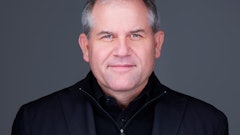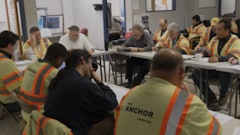
As business coaches Guy and I have spent countless of hours helping our clients transform themselves into Presidents. We teach them how to stay above the fray, how to lead their business to greater heights and better financial results. Along the way, we both have noticed the incredible difference between the attention white collar professionals and contractors pay to the issue of leadership.
Guy and I have been around hundreds of white collar executives and professionals over the years. They love to think about and talk about leadership. It's an obsession.
Contractors are a different breed. Contractors rarely aspire to be thought of as leaders. Contractors are more concerned with making money.
Alas, while white collar professionals waste way too much time and energy thinking about leadership, contractors spend far too little time and energy thinking about it. Understanding leadership and acting on that understanding will give you a competitive advantage.
Managers Maintain. Leaders Improve.
Managers keep the business running as it always has. Leaders make the business run better. Managers allow the economy to control their fate. Leaders adjust to, overcome and if possible, take advantage of economic swings.
Most likely, your competition is being run by managers. They aren't likely to improve their ability to conduct business.
If you learn to lead, you will improve the way you conduct business. Slowly but surely your business will blow by theirs. You will own a cost advantage, a brand advantage, and a staffing advantage. You will create advantages that are very difficult to copy. That's the foundation for long-term success and wealth creation. Opportunity is knocking on your door. Let it in.
Let's begin by asking the question that may be going through your mind "What the heck is leadership anyway?" We'll start by pointing out a handful of common leadership myths:
- Leaders must be charismatic and inspirational.
- You are either born to lead or you're not.
- A business can never have enough leaders.
- If some leadership is good, more is better.
These commonly held beliefs are totally, completely wrong. How do we know? We read and listened to dozens of experts and compared their ideas to the successful presidents we've met. Most of the experts are spewing junk. A few, such as Peter Drucker, appeared to be dead on.
Peter Drucker has been addressing leadership since the mid-60s. Here is what Mr. Drucker wrote in his 1992 book Managing For The Future.
"The foundation of effective leadership is thinking through the organization's mission, defining it, and establishing it, clearly and visibly. The leader sets the goals, sets the priorities, and sets and maintains the standards. He makes compromises, of course, indeed, effective leaders are painfully aware that they are not in control of the universe.) Only misleaders - the Stalins, Hitlers, Maos - suffer from that delusion. But before accepting a compromise, the effective leader has thought through what is right and desirable. The leader's first task is to be the trumpet that sounds a clear sound.
"What distinguishes the leader from the misleader are his goals. Whether the compromise he makes with the constraints of reality - which may involve political, economic, financial, or interpersonal problems - are compatible with his mission and goals or lead away from them determines whether he is an effective leader. And whether he holds fast to a few basic standards (exemplifying them in his own conduct), or whether "standards" for him are what he can get away with, determines whether the leader has followers or only hypocritical time-servers.
"The second requirement is that the leader sees leadership as responsibility rather than as rank and privilege. Effective leaders are rarely "permissive." But when things go wrong - and they always do - they do not blame others.
"But precisely because an effective leader knows that he, and no one else, is ultimately responsible, he is not afraid of strength in associates and subordinates. Misleaders are afraid; they always go in for purges. But an effective leader wants strong associates; he encourages them, pushes them, indeed glories in them. Because he holds himself ultimately responsible for the mistakes of his associates and subordinates, he also sees the triumphs of his associates and subordinates as his triumphs, rather than as threats.
"The final requirement of effective leadership is to earn trust. Otherwise, there won't be any followers - and the only definition of a leader is someone who has followers. To trust a leader, it is not necessary to like him. Nor is it necessary to agree with him. Trust is the conviction that the leader means what he says. It is a belief in something very old-fashioned, called "integrity." A leader's actions and a leader's professed beliefs must be congruent, or at least compatible. Effective leadership - and again this is very old wisdom - is not based on being clever; it is based primarily on being consistent."
We take the trust issue further. Trust generates from being trustworthy. To be trustworthy, you as President must make the tough decisions and those decisions must produce the desired results.
Employees really do WANT to follow. Deep down inside, they don't have the confidence and skill to make the hard decisions. They want, no they need, someone else to do it for them.
They are desperate to follow someone skilled enough to lead the business effectively. That means you, the President, must lead.
That means you must know when to initiate change. You must know how to push change through the business; how to re-enforce change until it becomes business-as-usual.
Note that Drucker advised not to confuse charisma with leadership. History is filled with great leaders who were completely devoid of charisma, personality, or charm. For example, Abraham Lincoln, Dwight Eisenhower, and Bill Gates all moved mountains without possessing an ounce of charisma.
Charisma comes in handy when change is being initiated, when a tough hurdle has to be overcome, when everyone is down in the dumps and needing a little pick me up. Alas, charisma is a drug. It is a temporary stimulant. True leadership is lasting. It's the energizer bunny. It just keeps working and working and working.
Like it or not, you ARE responsible for leading your organization, for being a high performing President. Your business needs to be run by an effective leader, one who knows when to initiate change and when not to.
Have you been leading or managing? Are you now committed to leading?
Take the night and decide what needs to change in your business. Start making the changes the second you walk into the office tomorrow morning. Start acting on this new commitment to be a highly effective President before your old habits push it to the back burner and turn it into another "something I really should be doing but am in no rush to" chore.
Additional resources that build on the topics of this article
Grow your business to greater heights
Better financial results
Leadership
Learn to lead
Trust




















